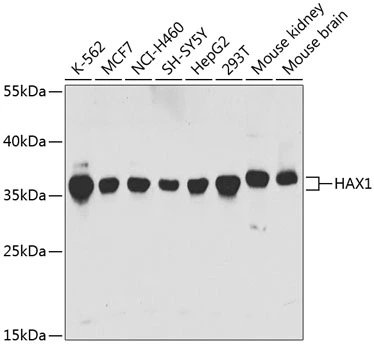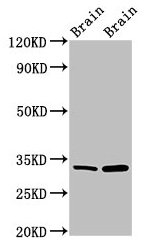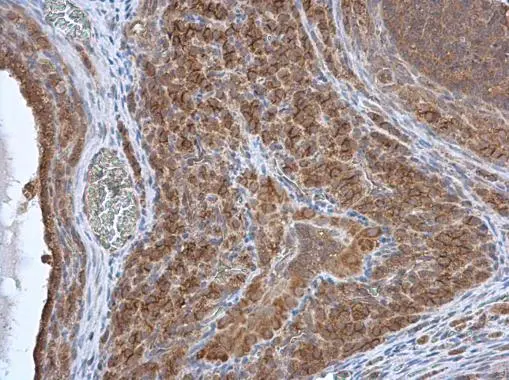
WB analysis of human testis lysate using GTX88468 HAX1 antibody, Internal. Dilution : 1μg/ml Loading : 35μg protein in RIPA buffer
HAX1 antibody, Internal
GTX88468
ApplicationsWestern Blot
Product group Antibodies
ReactivityHuman
TargetHAX1
Overview
- SupplierGeneTex
- Product NameHAX1 antibody, Internal
- Delivery Days Customer7
- Application Supplier NoteWB: 1-3microg/ml. *Optimal dilutions/concentrations should be determined by the researcher.Not tested in other applications.
- ApplicationsWestern Blot
- CertificationResearch Use Only
- ClonalityPolyclonal
- Concentration0.50 mg/ml
- ConjugateUnconjugated
- Gene ID10456
- Target nameHAX1
- Target descriptionHCLS1 associated protein X-1
- Target synonymsHCLSBP1, HS1BP1, SCN3, HCLS1-associated protein X-1, HAX-1, HCLS1 (and PKD2) associated protein, HS1 binding protein, HS1-associating protein X-1, HS1-binding protein 1, HSP1BP-1
- HostGoat
- IsotypeIgG
- Protein IDO00165
- Protein NameHCLS1-associated protein X-1
- Scientific DescriptionThe protein encoded by this gene is known to associate with hematopoietic cell-specific Lyn substrate 1, a substrate of Src family tyrosine kinases. It also interacts with the product of the polycystic kidney disease 2 gene, mutations in which are associated with autosomal-dominant polycystic kidney disease, and with the F-actin-binding protein, cortactin. It was earlier thought that this gene product is mainly localized in the mitochondria, however, recent studies indicate it to be localized in the cell body. Mutations in this gene result in autosomal recessive severe congenital neutropenia, also known as Kostmann disease. Two transcript variants encoding different isoforms have been found for this gene. [provided by RefSeq, Jul 2008]
- ReactivityHuman
- Storage Instruction-20°C or -80°C,2°C to 8°C
- UNSPSC12352203







